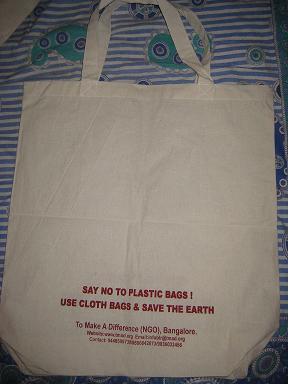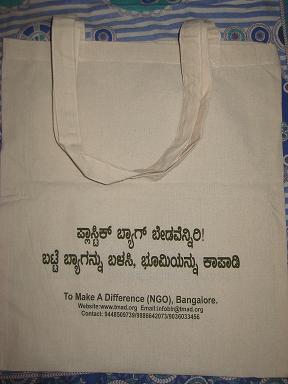An Eco-Friendly Non-Profit Initiative from TMAD
As part of creating awareness and promoting use of Cloth bags among the public, TMAD started selling cloth bags on no-profit basis. To know more about the how dangerous the use of plastic, please go through the faqs written after the images.
The price details are:
|
Bag Size |
Cost |
Sustaining Capacity |
|
Medium |
25 rupees |
4 to 5 kgs |
|
Large |
35 rupees |
6 to 7 kgs |
350 Cloth bags were sold by TMAD so far
Snap shots of the cloth bags:


For more Details regarding our initiative or bags, please contact us.
Volunteers: Kamalnath - 9886642073, Venkatesh – 9448509739 and Pavan - 9036033456.

“Say No to Plastic Bags! Use Cloth Bag to Save the Earth”
We do not inherit the earth from our ancestors; we borrow it from our children. Let us retake our responsibility of protecting our earth. Abandon plastic Avoid Pollution Achieve Green!!
As you open the gate of your home to go out, you will probably step over used plastic bags, empty biscuit wrappers or even empty pan masala pouches, strewn everywhere from the the street. All over the street, in the drains and on the pavements there are discarded plastic packets and bottles, used packaging and numerous packets with wasted food from the surrounding eateries. Plastic is a scourge that seems to have grown to alarming proportions.
The reason why plastic is an environmental hazard is because it is one of the few modern chemical materials that is not biodegradable. Polyethylene, polyvinyl chloride, and polystyrene are the composition base in the manufacture of plastics. These synthetic polymers are easily moulded into complex shapes and have high chemical resistance. Because of these properties they are used to manufacture several durable or disposable goods and for packaging materials.
However, plastic is resistant to biodegradation. A discarded plastic bottle can remain in a land fill for millions of years, so just consider the thousands of plastic bottles we discard on a daily basis. Bangalore alone generates roughly 40 tons of plastic waste per day, so is the city headed for environmental disaster?
Plastic bags end up as litter that fouls the landscape, and kill thousands of marine mammals every year that mistake the floating bags for food. Plastic bags that get buried in landfills may take up to 1,000 years to break down, and in the process they separate into smaller and smaller toxic particles that contaminate soil and water. Furthermore, the production of plastic bags consume millions of gallons of oil that could be used for fuel and heating.
“The average human in India uses 3 kg of plastic per person per year. That’s far lower than the European who consumes 60 kg per year, and the American who consumes 80 kg. Because we are so populous, the amount of plastic consumed is mindboggling and our disposal habits make it a health hazard. As long as our homes are clean, we are fine; throw all the plastic waste on the road for the corporation sweeper to clean. If they do not, we just sit back and grumble that the municipality is doing nothing.”
That’s one reason why drains get clogged in Bangalore, INDIA during the rains. Look into the open storm water drains which are invariably filled with all sorts of junked plastic. Milk sachets, mineral water bottles, grocery bags, empty plastic cans and containers.
We all need to take responsibility for this pollution which threatens to overwhelm the city. Carry a shopping bag like we did in the old days or put a basket into the dickey of your car into which you can fill a whole shopping cart. Stop buying bottled water; instead, buy a food grade plastic water bottle and carry your own water. Leave packaging behind in the shop, especially of large white goods, so it can be recycled rather than carry it home. If each of us cut back on our consumption of plastic responsibly, there will be much less floating around the garbage dumps in the city.
Is Paper Better Than Plastic?
Paper bags, which many people consider a better alternative to plastic bags, carry their own set of environmental problems. For example, according to the American Forest and Paper Association, in 1999 the U.S. alone used 10 billion paper grocery bags, which adds up to a lot of trees.
Reusable Bags Are a Better Option
But if you decline both paper and plastic bags, then how do you get your groceries home? The answer, according to many environmentalists, is high-quality reusable shopping bags made of materials that don’t harm the environment during production and don’t need to be discarded after each use.
What is Bio-Degradable? Materials that “break down and decompose into elements found in nature within a reasonably short amount of time when they are exposed to air, moisture and bacteria or other organisms” should be marketed as “biodegradable.”
Experts estimate that 500 billion to 1 trillion plastic bags are consumed and discarded annually worldwide—more than a million per minute.
Here are a few facts about plastic bags to help demonstrate the value of reusable bags—to consumers and the environment:
· Plastic bags aren’t biodegradable. They actually go through a process called photodegradation—breaking down into smaller and smaller toxic particles that contaminate both soil and water, and end up entering the food chain when animals accidentally ingest them.
· According to the Environmental Protection Agency, more than 380 billion plastic bags are used in the United States every year. Of those, approximately 100 billion are plastic shopping bags, which cost retailers about $4 billion annually.
· Hundreds of thousands of whales, dolphins, sea turtles and other marine mammals die every year after eating discarded plastic bags they mistake for food.
Plastic bags as litter have even become commonplace in Antarctica and other remote areas. According to David Barnes, a marine scientist with the British Antarctic Survey, plastic bags have gone from being rare in the late 1980s and early 1990s to being almost everywhere in Antarctica.
What is the alternative to Plastic bags:
Cotton & Jute bags are biodegradable & made from natural resources. Jute is a bast fibre, a vegetable fibre composed of cellulose, which is the main building material o plants & like all natural fibres, is totally biodegradable, so is cotton.
Recycled material bags are not as Green as Biodegradable Cloth Bag. To recycle any plastic or any synthetic fiber consumes a lot of petroleum based energy in its recycling process. Also it requires extremely organized collection system. It costs a lot of money to separate from other garbage. The most important is, the recycling approach keeps motivating and validating the manufacturing of new Synthetic fiber. So, the question is, why should we consume large amount of Petroleum based Energy to Recycle something when the recycling process is responsible for large amount of CO2 emission. This is a vicious cycle.
Large companies with huge Marketing techniques promote Polypropylene & Recycled Plastic. Also they say Cotton is no good. Because of the Cotton farms use Pesticides. But they do not say that, Cotton Farming is still greener than other option they offer and Cotton is Biodegradable.
Remember nothing is perfect. But we have to make our choice for the less defective option. As we know, we (human being) produce Carbon dioxide when we breathe. But we can not stop breathing because of that. We will die if we do so. The best option available as Green and cost effective at this moment in the entire world is cotton bags. This type of bag has become more popular as a "bag for life" as it is durable, re-useable & environment friendly.
Using this cloth bag helps us eliminate millions of plastic bags a year. Keep fighting for Earth.
